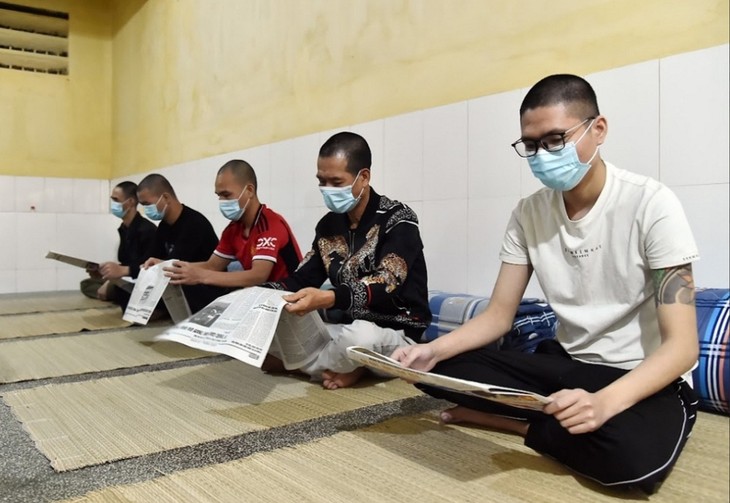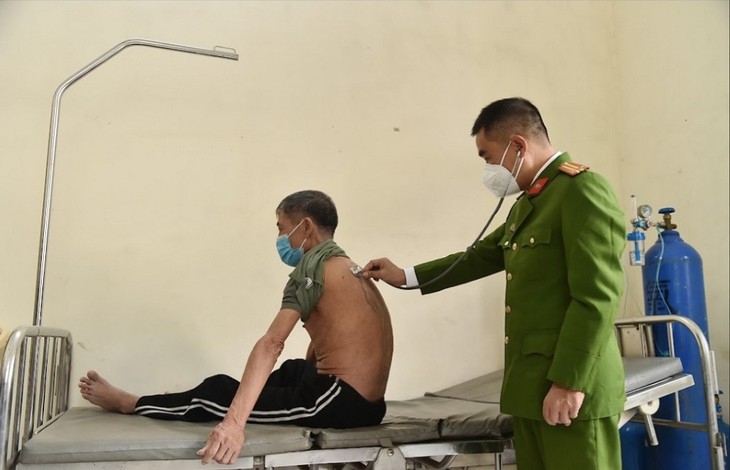(VOVWORLD) - Hanoi Police Detention Center No.1 in Nam Tu Liem district and Detention Center No.2 in Thuong Tin district are detaining about 6,000 convicts. Here the convicts’ legitimate rights, obligations, and interests are guaranteed in accordance with the Constitution and the law.
 At Detention Center No.1 (Photo: Ngoc Anh) At Detention Center No.1 (Photo: Ngoc Anh) |
At Detention Center No.2, superintendents closely follow the health conditions of convicts in each cell. Each officer at the two detention centers believes that ensuring the rights, obligations, and legitimate interests of detainees is their responsibility.
Senior Lieutenant Colonel Pham Chien Thang, Deputy Warder of Detention Center No.1, said that upon entering the detention centers, all detainees and persons held in temporary detention are informed by officials of their rights and obligations and the detention facility's regulations, which must be strictly complied with.
“The regulations are publicized and posted in all prison cells. Those who are detained or temporarily detained are allowed to participate in elections and have consular contacts, and have the right to meet their family. During the detention period, they can meet their family once a month,” said Thang.
All detainees and temporary detainees receive a medical check-up as soon as they begin their detainment at the center, said Lieutenant Colonel Nguyen Thanh Hai, head of the infirmary at Detention Center No.2.
“All detainees and temporary detainees are given a health check-up and classified by disease,” said Hai, adding, “Those in need of daily monitoring are taken to the infirmary for treatment and daily medication. Any case beyond the center’s treatment capacity is moved to a hospital for treatment.”
 Detainees receiving medical examinations and treatment at Detention Center No.2. (Photo: Ngoc Anh) Detainees receiving medical examinations and treatment at Detention Center No.2. (Photo: Ngoc Anh) |
A male prisoner from Hanoi named NDT, who has heart and lung diseases and is serving a 3-year imprisonment at Detention Center No.2, has been hospitalized for treatment by the Center. His health is now stable.
NDT recalled, “My situation is difficult. Without a family, all I could do is rely on the center's mechanism. Doctors at the center perform a medical examination in the morning and give medicine in the afternoon. The mechanism of the detention center is very good and humane. I’d like to thank the prison warders. Without their care, I wouldn’t have survived.”
At the detention centers, detainees are guaranteed a quantity of food, electricity, and water under the law. Pregnant women and nursing mothers receive double rations of food. On holidays, including the New Year holiday and National Day, the food ration of detainees is increased.
A woman named NTMH from Hanoi who is detained at Detention Center No.1 said that one month’s ration includes 17 kilos of rice, 15 kilos of vegetables, one kilo of meat and fish, and half a kilo of sugar.
“Every 3 months, we receive toothbrushes, toothpaste, and towels. Every day we’re given newspapers to read. My cellmates and I lack nothing essential and feel secure detained at the center,” said NTMH.
To ensure the rights of detainees, the Hanoi Police has invested in infrastructure and equipment at its detention facilities.
Lieutenant Colonel Cao Truong Hoan, Deputy Head of the Hanoi Police Investigation Agency, said tha the Hanoi Police ensures that all interrogations are recorded with audio and video. We guarantee the suspect’s right to a defense attorney, if they request one.
“If their family doesn’t hire a defense attorney, we ask the Vietnam Bar Federation or the Hanoi Bar Association to provide legal assistance,” said Hoan.
In addition to ensuring the health and living conditions of detainees, the warders at the two Detention Centers are persistent in educating the prisoners.
Lieutenant Colonel Tran Ngoc Duy, a warder at Detention Center No.1, said that all the warders follow the ‘4 know’ principle – know the face, know the name, know the family situation, and know the background and behavior leading up to the crime.
“For under-age detainees, we have a separate detention area, a special diet, and a guardian to attend interrogations and court proceedings,” said Duy.
Visiting a relative detained at Detention Center No.2, Le Thuy Linh of Bac Ninh province, said, “The procedure for visiting detainees is simple. The officers at the detention center are dedicated to helping. I can meet my relative by showing a prisoner visit book.”
Thanks to the efforts of officers and warders at the two detention centers, many prisoners have rehabilitated and integrated into the community.